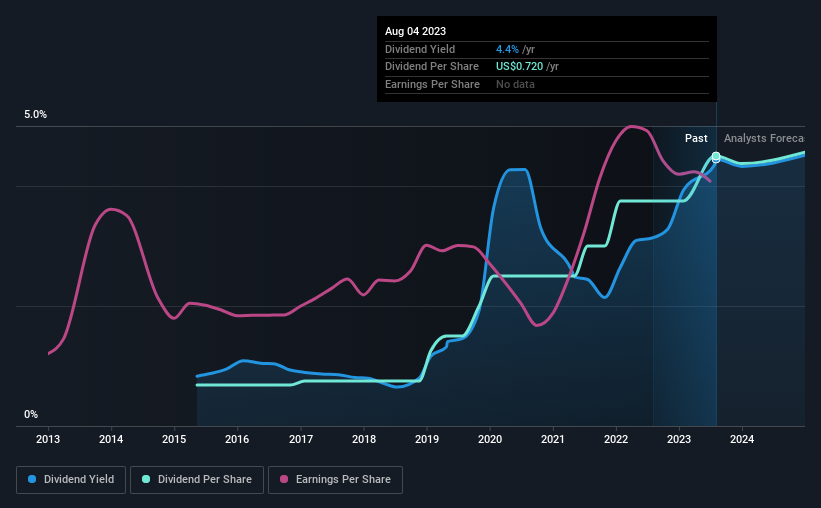Is It Smart To Buy PCB Bancorp (NASDAQ:PCB) Before It Goes Ex-Dividend?
Regular readers will know that we love our dividends at Simply Wall St, which is why it's exciting to see PCB Bancorp (NASDAQ:PCB) is about to trade ex-dividend in the next four days. The ex-dividend date occurs one day before the record date which is the day on which shareholders need to be on the company's books in order to receive a dividend. The ex-dividend date is an important date to be aware of as any purchase of the stock made on or after this date might mean a late settlement that doesn't show on the record date. Accordingly, PCB Bancorp investors that purchase the stock on or after the 10th of August will not receive the dividend, which will be paid on the 18th of August.
The company's next dividend payment will be US$0.18 per share, and in the last 12 months, the company paid a total of US$0.72 per share. Based on the last year's worth of payments, PCB Bancorp stock has a trailing yield of around 4.4% on the current share price of $16.18. If you buy this business for its dividend, you should have an idea of whether PCB Bancorp's dividend is reliable and sustainable. We need to see whether the dividend is covered by earnings and if it's growing.
See our latest analysis for PCB Bancorp
Dividends are typically paid out of company income, so if a company pays out more than it earned, its dividend is usually at a higher risk of being cut. PCB Bancorp paid out a comfortable 28% of its profit last year.
Companies that pay out less in dividends than they earn in profits generally have more sustainable dividends. The lower the payout ratio, the more wiggle room the business has before it could be forced to cut the dividend.
Click here to see the company's payout ratio, plus analyst estimates of its future dividends.
Have Earnings And Dividends Been Growing?
Businesses with strong growth prospects usually make the best dividend payers, because it's easier to grow dividends when earnings per share are improving. If earnings fall far enough, the company could be forced to cut its dividend. Fortunately for readers, PCB Bancorp's earnings per share have been growing at 14% a year for the past five years.
Another key way to measure a company's dividend prospects is by measuring its historical rate of dividend growth. PCB Bancorp has delivered an average of 27% per year annual increase in its dividend, based on the past eight years of dividend payments. It's great to see earnings per share growing rapidly over several years, and dividends per share growing right along with it.
Final Takeaway
Is PCB Bancorp an attractive dividend stock, or better left on the shelf? Companies like PCB Bancorp that are growing rapidly and paying out a low fraction of earnings, are usually reinvesting heavily in their business. Perhaps even more importantly - this can sometimes signal management is focused on the long term future of the business. We think this is a pretty attractive combination, and would be interested in investigating PCB Bancorp more closely.
While it's tempting to invest in PCB Bancorp for the dividends alone, you should always be mindful of the risks involved. For example, PCB Bancorp has 2 warning signs (and 1 which is significant) we think you should know about.
A common investing mistake is buying the first interesting stock you see. Here you can find a full list of high-yield dividend stocks.
Have feedback on this article? Concerned about the content? Get in touch with us directly. Alternatively, email editorial-team (at) simplywallst.com.
This article by Simply Wall St is general in nature. We provide commentary based on historical data and analyst forecasts only using an unbiased methodology and our articles are not intended to be financial advice. It does not constitute a recommendation to buy or sell any stock, and does not take account of your objectives, or your financial situation. We aim to bring you long-term focused analysis driven by fundamental data. Note that our analysis may not factor in the latest price-sensitive company announcements or qualitative material. Simply Wall St has no position in any stocks mentioned.

